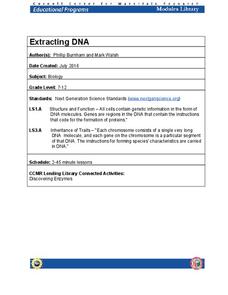Curated OER
Science Lessons
Tenth graders research about the different cell organelles. For this series of biology lessons, 10th graders compare two allotropes of carbon. They investigate how the rate of reaction is affected by concentration.
Curated OER
Life in a Drop of Water
Young scholars examine the structure, function, and characteristics of microscopic organisms that inhabit freshwater through collection of water samples and observation through microscopes.
Curated OER
Living Environment
For this environment worksheet young scholars complete a series of multiple choice and short answer questions on genetics, populations and cell structure.
Curated OER
"Attack A Cell, Any Cell" Disease Unit
Seventh graders use the Internet to gather information about a disease. They also discuss in groups how diseases are a worldwide problem and brainstorm ideas they can help. They create an informational packet on the disease they researched.
Curated OER
DNA Isolation from Onion
Students apply measurement skills using the metric system. They explain the process of isolating DNA from other cell contents. They apply knowledge of cell structure to explain the process of isolating DNA.
LABScI
Botany: The Plant Dissection Lab
Study everything about plants! The 12-part series of lessons continues with an examination of many aspects of plants. Components of the laboratory activity address the growth and structure of plants by evaluating familiar plants. The...
Virginia Department of Education
Building a DNA Model
It has been decades since the discovery of DNA. Still, activities such building this DNA model allow blossoming scientists to better understand the components that form this overall structure. During this activity, they will also...
University of Minnesota
Dendritic Spines Lab
This is your brain on drugs ... literally! Your neuroscientists-in-training examine the evidence of drug use on the human brain and how neurons change their connectivity when altered by drugs. They then work together to create testing...
The New York Times
Sequencing the Stages: Understanding H.I.V. Infection at the Molecular Level
How does HIV operate at the molecular level? Pupils discover the progression from a healthy immune cell to one infected with HIV, watch an animation of the HIV life cycle, and finally identify each of the stages with illustrations...
University of Minnesota
Close-up of the Nervous System
Make sure your class gets on your nerves! Learners of all ages practice peering into the nervous system to see what's inside. Groups examine prepared slides of mammalian nervous system tissues, all while gaining microscope skills. The...
Curated OER
Immunology
Students investigate the immune system. In this immune system lesson, students explore the immune system through participating in a WebQuest. After completing the WebQuest, students create a video documentary or chart.
Nuffield Foundation
Dissecting Lungs
Here is a lab activity where teens experience the respiratory system first-hand as they dissect lungs and identify key structures within the system. Although the website is written in British English with some slightly different verbiage...
Curated OER
DNA Extraction
Students are able to extract and observe a visible amount of DNA from Escherichia coli cells. They discuss the properties of DNA. Students confirm the presence of DNA by a reaction with an indicator.
Curated OER
Pond 2: Life in a Drop of Pond Water
Learners observe organisms found in pond water with a microscope. In groups, they discuss how single-celled organisms satisfy their needs for food, water and air. They compare and contrast the needs of macroscopic and microscopic...
Curated OER
Protists - The Protozoans
Five pages provide thorough coverage of three protozoans: euglena, amoebae, and paramecia. For each, junior biologists read factual text, label the organism, and write answers to several questions. This neatly organized assignment is...
Virginia Department of Education
DNA Extraction from Strawberries
Has your class ever been astounded by the complexity of DNA analysis? Have they ever asked why genetic engineering has become so important to our daily lives? Young scientists perform DNA extraction on strawberries and explore how the...
Curated OER
Neurons and the Nervous System
The highlight of this series is activitiy #4. Anatomy pupils examine slides of three unknown cells. With the function of the nervous system in mind, they consider the structure of each and try to guess which one is part of that system....
Cornell University
Extracting DNA
Uncover the basics of DNA structure through exploration activities. Collaborative groups build DNA models and recreate the process of replication. Then, using plant cells such as peas or strawberries, they extract a DNA sample.
Curated OER
Neuron Cookie
Find out just how enticing learning about neurons can be by creating models with sugar cookies, icing, and candy. With great background information for you and an easy procedure for the kids, studying cells has never been more fun or...
Serendip
DNA
Get up close and personal with DNA! A two-part hands-on activity has learners extract DNA from a small organism and then their own cheek cells. Scholars then explore DNA replication using questions to guide their analyses.
Curated OER
Gumdrop Crystal Models
A great way to learn about molecular structures is to make a model. Gumdrops and toothpicks are used to construct crystal models. The models are based on theories of crystal shapes that occur because of positive and or negatively charged...
Teach Engineering
Algae: Tiny Plants with Big Energy Potential
My, what big energy potential you have! Scholars learn about the energy potential of using algae as a biofuel. A PowerPoint presentation first describes the structure of algae and then how researchers use algae as biofuel to produce energy.
Curated OER
Student Cancer Journals -- Personal Reflections and Research on Life and Death Issues
Concepts learned in the study of mitosisand biochemistry help when making life or death decisions. Compile a notebook or portfolio of work related to the project can make the research more organized and relevant.
Curated OER
Mathematics in Bioengineering: Its Application for Today's Students
High schoolers explore the different fields of bioengineering. They will create and interpret graphs from cancel cells data. They then calculate the amount of drugs found in blood and eliminated by the body over time.
Other popular searches
- Plant Cell Biology
- Inquiry Based Cell Biology
- Cell Biology Mitosis
- Cell Structure Powerpoint
- Cell Biology Meiosis
- Cell Structure and Function
- Cell Biology Vocabulary
- Label Cell Parts
- Grade 11 Cell Biology
- Cell Parts Pictures
- Cell Biology Activities
- Human Cell Biology























